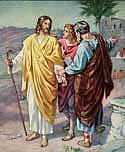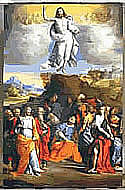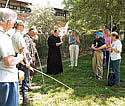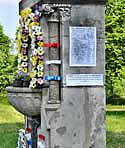 St Mary's Church, Dymock
St Mary's Church, Dymock
| Admin | |||
| . | Home | Contents | |
| H&S Policy | People Safety | Grave Yard | |
The Church & The World
Faith & Care
Faith & Care
Things Past
People & Features
People & Features
Seasons and Festivals

As well as the Seasons and Major Festivals, the church celebrates several 'Special Days' throughout the year to remember, honour or support our work in God's world. Celebration of the Special Days is usually optional, Christians chose which they want to include. Click here to view the 'Special Days'.

.
At the time when the Bible was written, people still didn't know that the world was a ball in the vastness of space, neither could they fly, so they still had the idea that the earth was flat and rested on Hades (Hell) that was beneath the earth, so Hades was therefore a bottomless pit, with heaven as the 'home of God' above the sky, as humans couldn't reach it. It's not surprising, therefore, that Jesus' return to God in heaven was seen at that time as 'Ascending' back to heaven.
.
All the Bible accounts tell us that Jesus rose alive from the dead after crucifixion and was seen by the women at the tomb, but differ slightly on what happened next. None of them say explicitly how Jesus returned to heaven, but use words that imply rising. In their Gospel accounts, Matthew and John don't mention it at all, Mark and Luke just say 'taken up into heaven' (Mark 16:19, Luke 24:51).
How did Jesus 'Ascend'?

.
It's for this reason that it's traditionally assumed that Jesus 'Ascended' back to God in heaven forty days after Easter so it's on the fortieth day that the church celebrates the Festival of 'Ascension'. Not surprisingly, classical artists from earlier eras have interpreted the 'Ascension' in terms of Jesus physically rising up from the earth. Those Christians who see the Bible as the literal word of God also see the Ascension as a physical rising up of Jesus in the traditional way, whilst those who see the Bible as describing fundamental truths, but limited by human language and experience, are content to agree that Jesus returned to God in heaven (since he is no longer physically seen on earth) but accept that we don't know in what form he went. (Return to top)
Outdoor Service

Outdoor Service with release of helium filled balloons
Rogation - Blessing the Fields

Rogation - Beating the Bounds

.
In older days, before Government Social Security payments, those who had fallen on hard times had to return to the parish where they were born to receive 'poor money' or some other support, even if they now lived at the other end of the country. It was not unknown for scoundrels to move the parish boundary markers, either to prevent the need to support someone legitimately from their own parish, or conversely to move the support of someone out of their parish and into the one next door!
.
A procession of clergy and parishioners would trace the boundary and hit or 'beat' the boundary markers with sticks... and often beat the church choir or village boys who were in the procession, in order to impress on their mind where the boundaries were.
Other Customs

Water: One suggests that rain on this day comes 'straight from heaven' and gives good luck or has special medicinal properties, especially associated with eyes. Another involves mixing water from a well with sugar to make a special drink - in this case, the day is called 'Sugar and Water Day'. Another popular custom associated with water around this time is 'Well Dressing' when villages dress-up one or more wells with flowers and greenery. The origins lie in pagan times, making an offering to the god of the well, and continued into the Christian era when some wells were even given a Christian name such as Holy Well or St Ann's Well, etc.
.
Fire Prevention: Another superstition was to receive a piece of hawthorn picked by someone else, or even an egg laid on Ascension Day, and place it in the rafters to prevent fire in the house.
.
Nest Building: In Shropshire it was suggested that rooks stopped nest-building on Ascension Day.
.
Sheet Drying: In Lincolnshire is was said hanging out a sheet to dry on this day would bring a death to the family.
(Return to top)